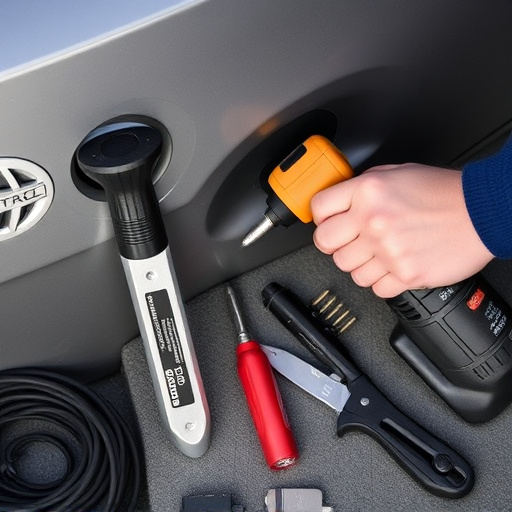Composite material replacement demands skilled technicians due to modern vehicles' advanced composite structures. These materials require specific knowledge and tools for effective repair, maintaining structural integrity, and original performance. Technicians assess damage, cut, shape, and mold with precision while understanding different composites like fiberglass and carbon fiber to ensure safety and quality in every replacement process.
In today’s advanced manufacturing landscape, composite material replacement is a game-changer. However, this intricate process demands skilled technicians to ensure precision and safety. Composite materials, with their complex structures and properties, require expert knowledge for effective manipulation.
This article explores why the role of trained professionals is pivotal in composite material replacement, delving into the technical intricacies and benefits of their craftsmanship. From ensuring structural integrity to upholding quality standards, these technicians are the unsung heroes revolutionizing industries.
- Composite Material Replacement: A Skilled Craftsmanship Demands
- The Complexity of Composite Materials: Why Expertise Matters
- Ensuring Safety and Quality: The Role of Trained Technicians
Composite Material Replacement: A Skilled Craftsmanship Demands

Composite material replacement is a meticulous process that demands the expertise of skilled technicians. In today’s automotive industry, where luxury vehicle repair and auto body repair are common, composite materials have become increasingly prevalent in vehicle construction. These advanced materials offer enhanced strength-to-weight ratios, making them a preferred choice for manufacturers. However, their unique properties also necessitate specialized knowledge and tools for effective replacement.
When a composite component becomes damaged, whether from an accident or normal wear and tear, technicians must carefully assess the extent of the damage. They then employ precise cutting, shaping, and molding techniques to create a perfect replacement part. This craftsmanship requires not just technical proficiency but also a deep understanding of composite material behavior. Skilled technicians know how to avoid weaknesses and ensure structural integrity in the new component, matching the original’s performance and aesthetics in automotive restoration projects.
The Complexity of Composite Materials: Why Expertise Matters

Composite materials, with their unique properties and widespread application across industries like automotive body work and vehicle body repair, present a challenge for even the most seasoned technicians. The complexity of these materials goes beyond their modern appeal; they demand precise handling due to intricate chemical compositions and structures. In tire services or any form of vehicle body repair, replacing composite components requires specialized knowledge to ensure structural integrity and durability.
Expertise in composite material replacement is crucial because these materials don’t simply snap together like traditional metals. They necessitate specific bonding techniques, specialized tools, and precise measurements. Skilled technicians understand the nuances of different composite types, from fiberglass to carbon fiber, knowing exactly how to prepare surfaces, select appropriate adhesives, and perform repairs that maintain the original strength and performance of the vehicle. This level of expertise is vital for ensuring safety and longevity in every composite material replacement process.
Ensuring Safety and Quality: The Role of Trained Technicians

When it comes to composite material replacement, especially in the automotive industry, safety and quality should never be compromised. This is where skilled technicians play a pivotal role. Trained professionals are equipped with the knowledge and expertise to handle these intricate repairs effectively, ensuring that every component is replaced accurately and securely. They understand the unique properties of composite materials and can adapt their techniques accordingly, preventing any potential hazards associated with incorrect installation.
The process involves precise cutting, shaping, and bonding, all of which require a steady hand and technical proficiency. Skilled technicians perform thorough inspections to identify damage, determine the extent of replacement needed, and choose the right composite materials for the job. Their expertise in auto body repairs and car bodywork services ensures that vehicles are restored to their original condition or even beyond, maintaining structural integrity and aesthetic appeal.
In conclusion, the successful implementation of composite material replacement within various industries necessitates a skilled technician. The complexity and versatility of composite materials demand expertise to ensure safety, quality, and long-lasting performance. As these materials continue to revolutionize sectors such as aerospace and automotive, relying on trained professionals is paramount for achieving optimal results in composite material replacement.













